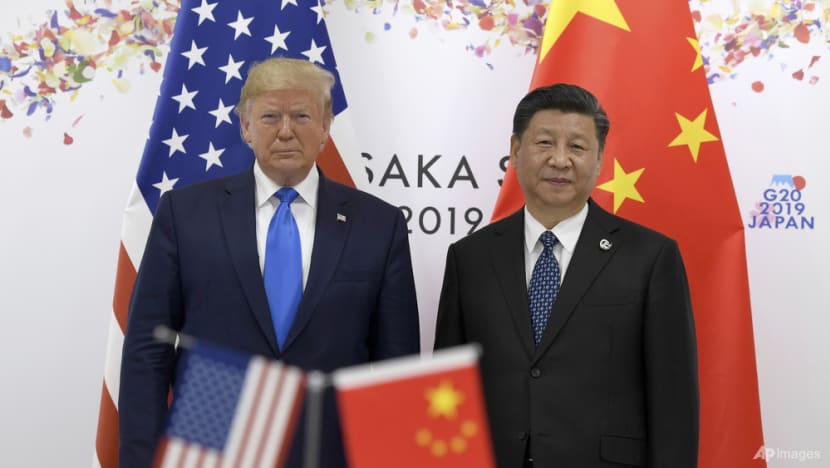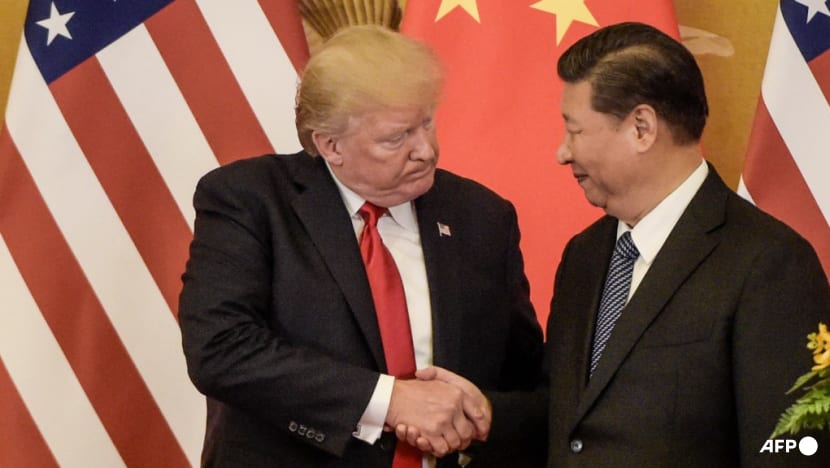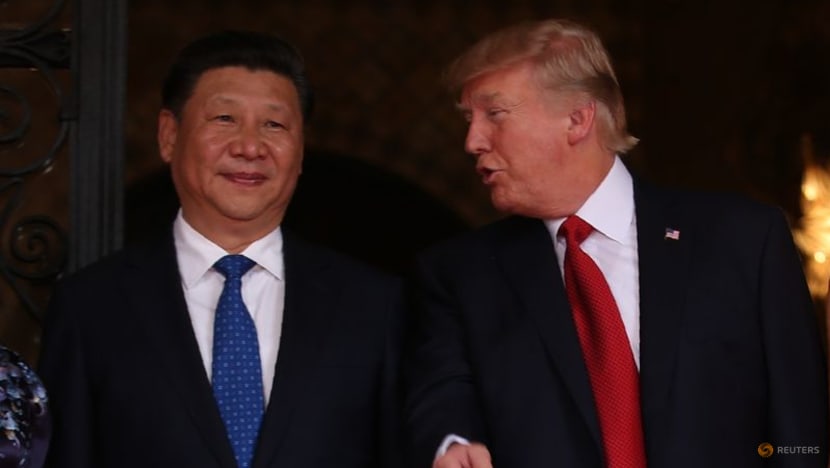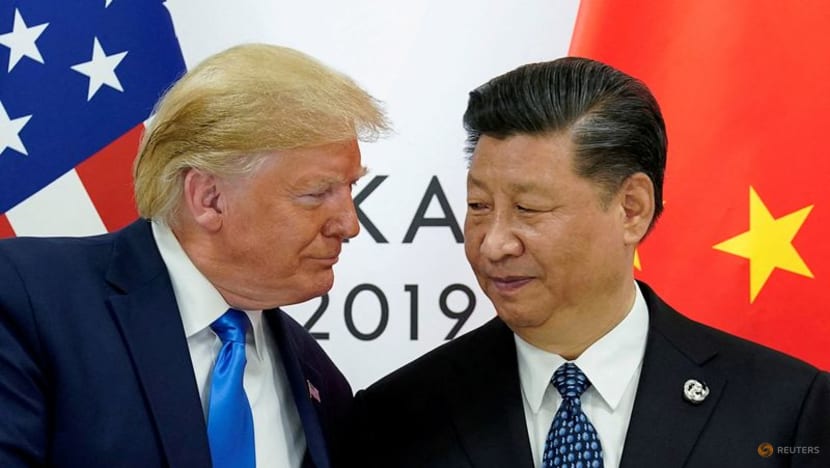Trump and Xi agree to further talks to settle trade disputes
The highly anticipated phone call between the leaders is the first time they have directly spoken since Trump's "reciprocal" tariffs sparked a fresh trade war.

President Donald Trump poses for a photo with Chinese President Xi Jinping during a meeting on the sidelines of the G-20 summit in Osaka, Japan, Jun 29, 2019. (File photo: AP/Susan Walsh)
BEIJING: US President Donald Trump said the United States is "in very good shape" with China on trade after a phone call with Chinese leader Xi Jinping on Thursday (Jun 5), during which both sides agreed to further talks aimed at resolving their tariff disputes.
"There should no longer be any questions respecting the complexity of Rare Earth products," Trump wrote on social media. "Our respective teams will be meeting shortly at a location to be determined."
"The conversation was focused almost entirely on TRADE. Nothing was discussed concerning Russia/Ukraine, or Iran," Trump wrote.
Both leaders extended invitations to visit each other's countries in future, according to official summaries of the call.
Trump noted that the call was "very good" and lasted about one-and-a-half hours, resulting in a "very positive conclusion for both countries".
The Chinese government said in a statement published by the official Xinhua news agency that the US should take a "realistic view" of the progress made and "withdraw the negative measures imposed on China".
"Xi Jinping welcomed Trump's visit to China again, and Trump expressed his sincere gratitude," it added.

The highly anticipated call came amid accusations between Washington and Beijing in recent weeks over "rare earths" minerals in a dispute that has threatened to tear up a fragile truce in the trade war between the two biggest economies.
In the call, Xi also urged the US to exercise prudence on the Taiwan issue and avoid sending conflicting signals. Taiwan remains a sensitive flashpoint in the bilateral relationship, though it was not a primary focus of the discussion.
The countries struck a 90-day deal on May 12 to roll back some of the triple-digit, tit-for-tat tariffs they had placed on each other since Trump's January inauguration.
Though stocks rallied, the temporary deal did not address broader concerns that strain the bilateral relationship, from the illicit fentanyl trade to the status of Taiwan and US complaints about China's state-dominated, export-driven economic model.
Since returning to the White House in January, Trump has repeatedly threatened an array of punitive measures on trading partners, only to revoke some of them at the last minute. The on-again, off-again approach has baffled world leaders and spooked business executives, who say the uncertainty has made it difficult to forecast market conditions.
China's decision in April to suspend exports of a wide range of critical minerals and magnets continues to disrupt supplies needed by automakers, computer chip manufacturers and military contractors around the world.
Beijing sees mineral exports as a source of leverage - halting those exports could put domestic political pressure on the Republican US president if economic growth sags because companies cannot produce mineral-powered products.

The 90-day deal to roll back tariffs and trade restrictions is tenuous. Trump has accused China of violating the agreement and has ordered curbs on chip design software and other shipments to China, while also doubling steel and aluminium tariffs to 50 per cent. Beijing rejected the claim and threatened countermeasures.
In recent years, the United States has identified China as its top geopolitical rival and the only country in the world able to challenge the US economically and militarily.
Despite this and repeated trade threats and tariff announcements, Trump has spoken admiringly of Xi, including of the Chinese leader's toughness and ability to stay in power without the term limits imposed on US presidents.
Trump has long pushed for a call or a meeting with Xi, but China has rejected that as not in keeping with its traditional approach of working out agreement details before the leaders talk.
The US president and his aides see leader-to-leader talks as vital to sort through log-jams that have vexed lower-level officials in difficult negotiations.
Politics and international studies professor Stephen Nagy told CNA's Asia First that the Chinese had a "much more subdued conclusion" to the call, while Trump "in his typical salesman-like way, generally upsold the results of this call".
"China's the biggest prize, I think, for Mr Trump. And touting a successful call with Mr Xi and having that call is a political win for him, although it may not have any actual substance to date," he added.

The professor from the International Christian University said that no expert would be convinced there has been "any substantial change in the tensions and the competition" between Trump and Xi.
"We look at the relationship (through a lens of) who is going to win the technological competition? And who's going to shape the rules of trade and technology over the 21st, 22nd and 23rd century?" he added.
"The trade talks are really, I think, just the first round in a very, very long battle ... They're both looking for a political win."
Nagy noted that Trump may be looking for some form of economic gain over the summer as he begins other initiatives.
The Chinese economy is also still dependent on America's export market, he said.
"Nothing's going to replace that US$800 billion of trade that that China has with the United States, and this means millions and millions and millions of jobs in China. So they both have incentive to come and talk and step back, but over the long term, I think this competition is going to deepen," Nagy said.
Thursday's call came at Trump's request, China said. It's not clear when the two men last spoke.
Both sides said they spoke on Jan 17, days before Trump's inauguration and Trump has repeatedly said that he had spoken to Xi since taking office on Jan 20. He has declined to say when any call took place or to give details of their conversation. China had said that the two leaders had not had any recent phone calls.
Oil markets rose slightly on news of the renewed dialogue. Brent crude futures climbed 0.5 per cent to US$65.21 per barrel, while West Texas Intermediate gained 0.6 per cent to US$63.23. Analysts said the easing of trade tensions could boost global demand expectations, particularly in the US and China.
"If we step back from the brink of a major trade war, it will increase demand expectations for oil both in the US and in China," said Phil Flynn, senior analyst with Price Futures Group.
Meanwhile, investors are closely watching for any follow-up announcements from the talks. Market participants remain cautious, with attention also on Saudi oil price moves, OPEC+ production hikes, and broader global economic headwinds.
The talks are being closely watched by investors worried that a chaotic trade war could cut into corporate earnings and disrupt supply chains in the key months before the Christmas holiday shopping season. Trump's tariffs are also the subject of ongoing litigation in US courts.
Trump has met Xi on several occasions, including exchange visits in 2017, but they have not met face to face since 2019 talks in Osaka, Japan.
Xi last travelled to the US in November 2023, for a summit with then-President Joe Biden, resulting in agreements to resume military-to-military communications and curb fentanyl production.













